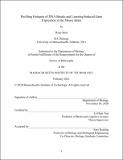Profiling hotspots of DNA breaks and learning-induced gene expression in the mouse brain
Author(s)
Stott, Ryan(Ryan Timothy)
Download1251767414-MIT.pdf (32.08Mb)
Other Contributors
Massachusetts Institute of Technology. Department of Biology.
Advisor
Li-Huei Tsai.
Terms of use
Metadata
Show full item recordAbstract
Neuronal activity generates DNA double-strand breaks (DSBs) in the brain. Topoisomerase IIb (TOP2B), important for relieving transcription-associated DNA supercoiling, was implicated as the source of these neuronal activity-induced DSBs, facilitating rapid transcriptional induction of immediate early genes (IEGs). However, the locations of these DSBs in vivo and their relation to brain function was unclear. In Chapter 2, following contextual fear conditioning (CFC) of wild type mice, we profiled the locations of DSBs genome-wide through gH2AX ChIP-Seq, along with transcriptomic changes in neuronal and glial-enriched nuclei in two brain regions. We found DSB-susceptible genes were involved in synaptic processes, while both activity-regulated and proteostasis-related transcription factors appeared to govern gene expression changes across cell types at some sites of gH2AX. Finally, we found that glia have a robust transcriptional response to glucocorticoids and some of these genes are sites of brain DSBs. In Chapter 3, we examined the relationship between brain DNA breaks and TOP2B function. We utilized a mouse forebrain excitatory neuron-specific functional knockout of Top2b. We found that neuronal loss of Top2b in the medial prefrontal cortex (mPFC) impairs both the expression of long genes and gene induction following exposure to a learning paradigm. Ultimately, loss of Top2b leads to abnormal learning and cognition.
Description
Thesis: Ph. D., Massachusetts Institute of Technology, Department of Biology, February, 2021 Cataloged from the official PDF of thesis. "February 2021." Includes bibliographical references.
Date issued
2021Department
Massachusetts Institute of Technology. Department of BiologyPublisher
Massachusetts Institute of Technology
Keywords
Biology.